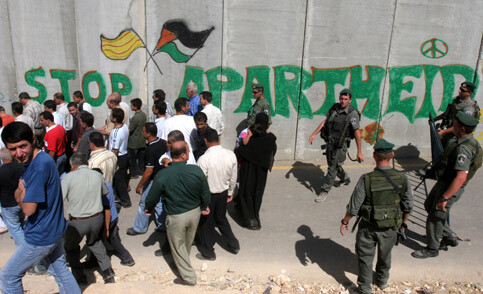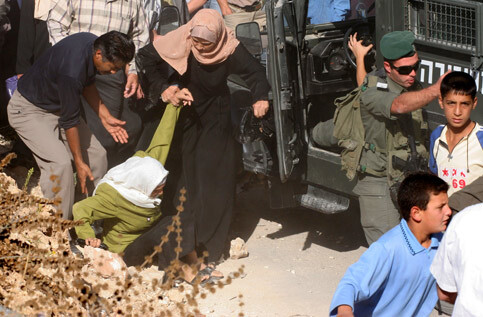West Bank 7 October 2006

Israeli Soldiers scuffle with Palestinian worshipers trying to pass the checkpoint between Bethlehem and Jerusalem in order to pray at the Al-Aqsa Mosque for the second Friday of the holy month of Ramadan, 6 October 2006. (MaanImages/Magnus Johansson)
Normally, the holy month of Ramadan is a festive season of heightened spirituality and good will. It is also an occasion where family members share the usually exquisite Iftar meals immediately after sunset at the end of the day-long fast. However, for many Palestinian families, hard-hit by extremely harsh Israeli-western sanctions, this Ramadan has the smell of real penury. Abject poverty is also becoming increasingly apparent among the traditionally weak sectors of society, such as day-laborers.
Yousuf M. Suleiman is a school teacher of 30 years from the southern West Bank town of Hebron. He has a family of eight but can hardly get things “under control” when it comes to securing the basic needs such as flour, sugar and rice.
“I really don’t know what to tell you. Would you believe me if I told you that last week we didn’t have bread for three days?” said Suleiman, with a clearly subdued voice.
Suleiman, like the rest of the estimated 170,000 Palestinian public employees and civil servants, has not received his salary for the seventh consecutive month due to the economic blockade imposed by Israel, the US and EU on the Hamas-led government.
The government has paid “advance payments” amounting to 50-60 percent of the regular salaries. However, the meager and irregularly-paid sums have not made much of a difference for most Palestinian families, especially during Ramadan when family spending increase substantially.
So how do these poverty-stricken families make thing do? How do they explain to the children the sudden and unprecedented poverty haunting them?
Akram Hussein is a Palestinian policeman, with a wife and two small children. He says that all the “tricks and innovations” he has been devising to overcome the financial problem are being exhausted.
“Now the nearby grocery store won’t give us on credit any more. He says he will go bankrupt himself if he kept selling things on credit. And I must say he is right.
“Sometimes I tell the kids that the money is in the bank but the bank is now closed, but they often squeeze me with all kinds of questions which expose the trick.”
Asked what he is going to do, Hussein looks heavenward, saying the solution is God’s hands.
Charities
Palestinian families who don’t have the basic foods, such as flour and sugar, are normally helped by the local Zakat (Alms) committees. However, the assistance is getting more meager and more irregular and can hardly make up for the unpaid salaries which nobody knows when they will be paid in full.
Samir Rabi’e is a clerk at the local Zakat committee in Dura, 10 miles south west of Hebron. He says that demands on food has been greater than ever.
“Now we have a lot of previously well-to-do people asking for assistance. This is not a natural situation; it is induced poverty imposed by the Americans and the Israelis for political reasons.”
Rabai’e complained that Israel and the Americans “won’t give us mercy and won’t allow God’s mercy to reach us,” citing a Palestinian proverb.
“And the rich Arab states prefer to heed America’s demands rather than shield Palestinian children from the ghoul of starvation.”
He pointed out that the US, acting on Israel’s behalf, has bullied the Gulf states, including Saudi Arabia, to prevent Muslim donors from sending their charity to the occupied territories.
“Now we mostly rely on local sources which are scarce, meager and can’t really meet the huge and growing demand.”
Another Zakat official in Bethlehem, who wouldn’t give his name for security reasons, urged Muslims to bypass government control mechanisms and help the Palestinians face “this criminals and cruel siege by the enemies of Islam.”
“Please, send your charity money and donations to your brothers and sisters in Palestine. Don’t wait for your governments’ approval because your governments are likely to be mere puppets of the United States and Israel.
“We must never reach a situation where we need a permission from the Americans to practice our religions. If helping a starving child in Rafah or Nablus is terror, then let all of us be terrorists.”

A Palestinian woman falls as Israeli soldiers try to prevent worshipers from passing the checkpoint between Bethlehem and Jerusalem in order to pray at the Al-Aqsa Mosque for the second Friday of the holy month of Ramadan, 6 October 2006. (MaanImages/Magnus Johansson)
Bread and tea
There are many Palestinian families whose honor and pride won’t allow them to ask for food openly and publicly, even from the Zakat committees.
These, said Rabi’e, are suffering silently.
“I personally know families that break their fast at the end of the day on bread and tea. It is these people who need particular attention.”
According to some sources, there are already early signs of malnutrition among children public schools.
“Physically the signs are not conspicuous, but we notice that many children can’t concentrate or are absent-minded, this could be the result of children not having sufficient nutrition,” said a Hebron school principal.
He said schools couldn’t do much about the problem other than writing reports to the ministry of education.
Catastrophe in Gaza
Israel is not only impoverishing and starving Palestinian by denying them access to food and work, but is actually killing them in droves and on a daily basis.
Indeed, not a day passes without a number of Palestinians getting killed and maimed in Gaza where an average of three to five Palestinians, most of them innocent civilians, are killed on any given day.
On the fifth day of Ramadan, an Israeli tank fired an artillery shell at a northern Gaza home, killing two teenage brothers. That was the “perfect” Ramadan gift by Israel to that Gazan family. And more and more “gifts” of this kind are in the offing, as indicated by the Israeli Chief of Staff, Dan Halutz, who said he slept well the night he ordered the dropping of a one-ton bomb on a Gaza apartment building in 202, killing 12 sleeping children.
As usual in such circumstances, the Israeli army claimed that “two terrorists” were killed. The concocted lie was readily and blithely carried by western news agencies and then quoted by media around the world. So, the innocent is killed and the story of their murder is also killed.
According to figures compiled by human rights organizations and the Palestinian Health Ministry, the Israeli occupation army has killed more than 226 Palestinians in Gaza alone since June 25 when Palestinian guerillas abducted an Israeli occupation solider near Rafah. Hundreds others, mostly children and innocent civilians, have also been maimed and injured by indiscriminate Israeli bombing and bombardments.
Moreover, the Israeli air-force bombed and utterly destroyed the bulk of Gaza’s civilian infrastructure, very much like it to the Lebanese infrastructure during the recent war with Hizbullah.
The “targets” included schools, colleges, bridges, office buildings, and ordinary homes in addition to the only power station in Gaza the destruction of which plunged Gaza into darkness. The local authorities in Gaza have sought desperately to partially solve the problem by importing electricity from Egypt and alternating electricity supplies to various localities, thus enabling Gazans to have a few hours of electricity supply per day.
Israel normally justifies its massive bombings of Palestinian homes and neighborhoods by security considerations. However, the utter disproportionality and vengefulness of the bombings suggest that Israel is only interested in making as many Palestinians as possible suffer. Maybe Israelis are after all emulating their former tormentors? Well, haven’t they been doing that all along, some would say?
This year, the Israeli army has introduced a novel tactic of terrorizing Gaza citizens. It is the telephone terror whereby Israeli Shin Bet agents telephone a given Palestinian family to tell them that their home would be bombed within five minutes and that they would be killed if they didn’t leave immediately.
The evil calls normally are made in the quiet hours before dawn and are designed to inflict maximal terror on the families who are forced to jump out of their beds onto the streets, only to see their homes and their belongings and everything destroyed by air-to-ground missiles fired by indifferent Jewish hands.
This week, when a home was bombed this way, some revelers came to see what was going on, only to be greeted by another salvo of bombs raining from the sky. A girl of 14 years was instantly killed by shrapnel. Ten other children were injured, one seriously.
According to Israeli sources, the Israeli goal in Gaza, and to a lesser extent in the West Bank, is to generate an explosive implosion among Palestinians, so much so that they would begin to kill each other.
The experiment, using the term used by veteran Israeli journalist Amira Hass, has succeeded.
Last week, as many as 14 Palestinians were killed in internal disturbances ignited by the claustrophobic siege on the estimated 1.5 million Gazans who are barred from accessing food and work and are effectively confined to a pressure cooker.
And when Israeli officials are confronted with the question of how they could allow themselves to starve and torment the prisoner population, who are still practically under the Israeli occupation since Israel still controls rather tightely all Gaza’s border crossings, the officials simply shrug their shoulders and invoke the mantra of terror as if starving innocent people were not a criminal act of terror itself.
This week, visiting US Secretary of State Condoleezza Rice, instead of treating the situation in Gaza in particular and the occupied territories in general as a humanitarian disaster, congratulated her Israeli counterpart Tsibi Livni on the “success” and “effectiveness” of the Israeli-American sanctions against the prisoner Palestinian population.
With this moral depravity and criminal hypocrisy, unseen since Hitler’s armies surrounded Ghetto Warsaw during the Second World War, Palestinian suffering is even likely to exacerbate.
And the world is also likely to keep silent, just as did then.
This is how Ramadan looks like in Gaza in 2006.
Related Links
Khalid Amayreh is a professional journalist and political analyst from Dura, 10 km. south west of Hebron in the West Bank. His writings appear frequently in Al-Ahram Weekly and Al-Jazeera.




